Related Research Articles
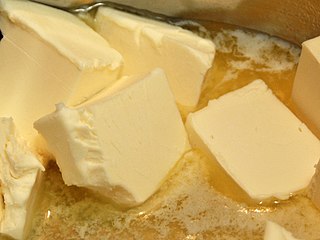
Butter is a dairy product made from the fat and protein components of churned cream. It is a semi-solid emulsion at room temperature, consisting of approximately 80% butterfat. It is used at room temperature as a spread, melted as a condiment, and used as a fat in baking, sauce-making, pan frying, and other cooking procedures.
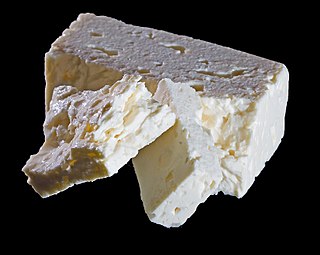
Feta is a Greek brined white cheese made from sheep's milk or from a mixture of sheep and goat's milk. It is soft, with small or no holes, a compact touch, few cuts, and no skin. Crumbly with a slightly grainy texture, it is formed into large blocks and aged in brine. Its flavor is tangy and salty, ranging from mild to sharp. Feta is used as a table cheese, in salads such as Greek salad, and in pastries, notably the phyllo-based Greek dishes spanakopita "spinach pie" and tyropita "cheese pie". It is often served with olive oil or olives, and sprinkled with aromatic herbs such as oregano. It can also be served cooked, as part of a sandwich, in omelettes, and many other dishes.
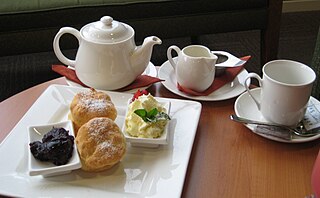
A cream tea is an afternoon tea consisting of tea, scones, clotted cream, jam, and sometimes butter. Cream teas are sold in tea rooms throughout England, especially Devon and Cornwall, and in some other parts of the Commonwealth.

Three European Union schemes of geographical indications and traditional specialties, known as protected designation of origin (PDO), protected geographical indication (PGI), and traditional speciality guaranteed (TSG), promote and protect names of agricultural products and foodstuffs, wines and spirits. Products registered under one of the three schemes may be marked with the logo for that scheme to help identify those products. The schemes are based on the legal framework provided by the EU Regulation No 1151/2012 of the European Parliament and of the Council of 21 November 2012 on quality schemes for agricultural products and foodstuffs. This regulation applies within the EU as well as in Northern Ireland. Protection of the registered products is gradually expanded internationally via bilateral agreements between the EU and non-EU countries. It ensures that only products genuinely originating in that region are allowed to be identified as such in commerce. The legislation first came into force in 1992. The purpose of the law is to protect the reputation of the regional foods, promote rural and agricultural activity, help producers obtain a premium price for their authentic products, and eliminate the unfair competition and misleading of consumers by non-genuine products, which may be of inferior quality or of a different flavour. Critics argue that many of the names, sought for protection by the EU, have become commonplace in trade and should not be protected.

The following four classifications of wine constitute the Italian system of labelling and legally protecting Italian wine:

Burrata is an Italian cow's milk cheese made from mozzarella and cream. The outer casing is solid cheese, while the inside contains stracciatella and clotted cream, giving it an unusual, soft texture. It is a speciality of the Puglia region of southern Italy.
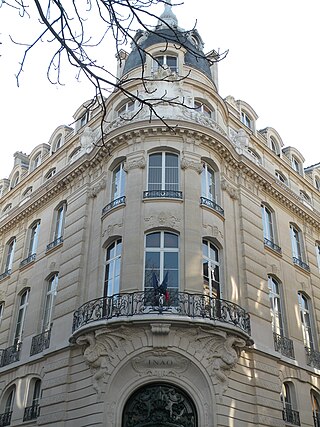
In France, the appellation d'origine contrôlée is a label that identifies an agricultural product whose stages of production and processing are carried out in a defined geographical area – the terroir – and using recognized and traditional know-how. The specificity of an AOC product is determined by the combination of a physical and biological environment with established production techniques transmitted within a human community. Together, these give the product its distinctive qualities.
Latvian cuisine typically consists of agricultural products, with meat featuring in most main dishes. Fish is commonly consumed due to Latvia's location on the eastern shore of the Baltic Sea.

A fruit butter is a sweet spread made of fruit cooked to a paste, then lightly sweetened. It falls into the same category as jelly and jam. Apple butter and plum butter are common examples, but fruit butters can be made from any firm fruit. Fruit pastes, such as quince cheese are popular in Latin American countries, are similar but more highly sweetened and jelled. They are sold in shallow tins or as wrapped bricks, while fruit butters usually come in wide-mouthed jars and are more common in Central and Eastern Europe.
The denominação de origem controlada is the system of protected designation of origin for fruit, wines, cheeses, butters, and other agricultural products from Portugal.

Bremer Klaben, or just Klaben, is a type of Stollen from Bremen, Germany. This celebrated bread, famous in Northern Germany, is traditionally eaten during the Christmas season. It is said that Bremer Klaben tastes especially good when it is baked two weeks before serving. It has a shelf life of several months.
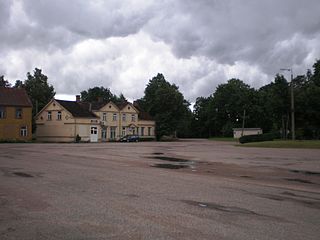
Rucava Parish is an administrative unit of South Kurzeme Municipality, Latvia. The parish has a population of 1250 and covers an area of 238.1 km2.
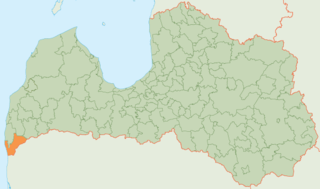
Rucava Municipality is a former municipality in Courland, Latvia. The municipality was formed in 2009 by merging Dunika Parish and Rucava Parish, the administrative centre being Rucava. The population in 2020 was 1,451.
Beurre d’Ardenne is a type of butter made in the Ardenne of Belgium from cow's milk.
Imokilly Regato is a cows' milk hard cheese made in Mogeely, County Cork, Ireland.
Magiun of Topoloveni is a Romanian traditional plum based spread, which has received a Protected Geographical Status from the European Union since 2011. Magiun of Topoloveni is a kind of jam made from very ripe plum fruit varieties, without any added sugar. It is from the town of Topoloveni and surrounding villages in the Argeș County.
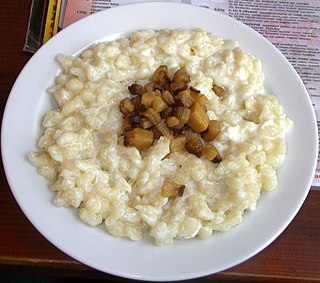
Traditional foods are foods and dishes that are passed on through generations or which have been consumed for many generations. Traditional foods and dishes are traditional in nature, and may have a historic precedent in a national dish, regional cuisine or local cuisine. Traditional foods and beverages may be produced as homemade, by restaurants and small manufacturers, and by large food processing plant facilities.
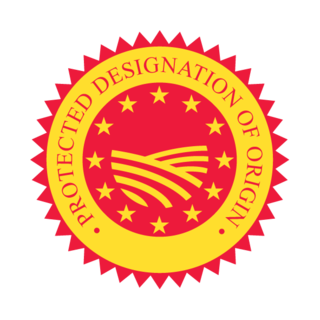
The protected designation of origin (PDO) is a type of geographical indication of the European Union aimed at preserving the designations of origin of food-related products. The designation was created in 1992 and its main purpose is to designate products that have been produced, processed and developed in a specific geographical area, using the recognized know-how of local producers and ingredients from the region concerned.

South Kurzeme Municipality is one of the 35 municipalities established in Latvia in 2021. It surrounds Liepāja, Latvia's third largest city. Its first elected municipal council took office on 1 July 2021. Its seat is at Grobiņa.
References
- ↑ "Implementing Regulation (EU) 2018/1213 of 28 August 2018 entering a name in the register of protected designations of origin and protected geographical indications ('Rucavas baltais sviests' (PGI)) C/2018/5794". EUR-Lex. European Union. 5 September 2018. Retrieved 11 September 2018.
- ↑ "No buts, it's Rucava butter!". Public Broadcasting of Latvia. LETA. 6 September 2018. Retrieved 11 September 2018.
- ↑ "Latvian butter receives European protection". Baltic News Network. 6 September 2018. Retrieved September 6, 2016.